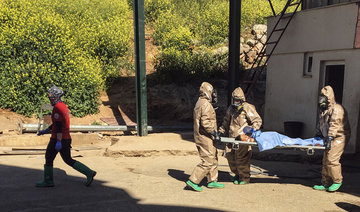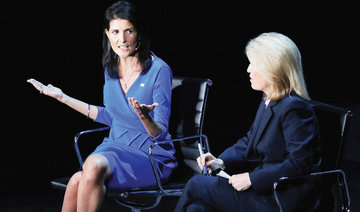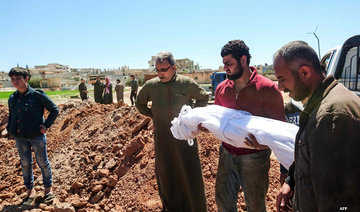WASHINGTON: US President Donald Trump told members of Congress he is “considering military action in Syria,” after a suspected chemical attack that killed at least 83 people.
Trump’s assertion, reported by CNN, came a day after he accused the Syrian regime of gassing its people and pledged that “these heinous actions cannot be tolerated.”
Speaking to reporters aboard Air Force One on Thursday, Trump said that what happened in Syria is “a disgrace to humanity” and “what Assad did is terrible.”
Asked if Assad should go, Trump said: “He’s there, and I guess he’s running things so something should happen.” He said the attack “shouldn’t have happened, and it shouldn’t be allowed to happen.”
While no decision has been made yet, a defense analyst told Arab News that military options could include “US cruise missile strikes against major Syrian Air Force installations.”
Following the chemical weapons attack in Idlib on Monday, CNN reported Thursday that Trump is considering military action in Syria but “had not firmly decided to go ahead with it.”
He is “discussing possible actions with Defense Secretary James Mattis,” it was reported.
Mattis’ role appears to be central as the Pentagon has submitted to the US administration “long-standing options to strike Syria’s chemical weapons capability,” according to CNN.
French Foreign Minister Jean-Marc Ayrault said Thursday that “a day will come when international justice will give its verdict on (Syrian President) Bashar Assad who is massacring his people.”
Speaking to news channel CNEWS, he added: “These crimes must not go unpunished. In any case, there are investigations, United Nations commissions... there will be a war crimes trial.
“It’s difficult because up to now every time we have presented a resolution, there has been a veto by Russia and sometimes by China ... but we must cooperate because we need to stop this massacre.”
German Chancellor Angela Merkel said it was a scandal that the UN Security Council did not pass a resolution condemning the suspected chemical attack in Syria this week.
“It was a barbaric attack that must be cleared up. The use of chemical weapons is a war crime,” Merkel told a news conference in eastern Germany, adding there were some indications it was carried out by Assad’s forces.
“It is a scandal that no UN Security Council resolution materialized and those who opposed it must consider what responsibility they bear,” she said.
Tobias Schneider, a defense analyst based in Berlin and a close watcher of the Syrian conflict, told Arab News that “as of now, there appears to be no coherent position coming from the White House.”
He added: “If Trump is indeed willing to push aside institutional skepticism about intervention against Assad, he will be looking for military options that are both sufficiently symbolic and punitive.”
Such options could include, according to Schneider, “cruise missile strikes against major Syrian Air Force installations,” but could “obviously risk ... accidentally hitting Russian troops.”
Schneider also cautioned that “after the dust settles, Assad could repair the damaged runways and claim for himself to have survived an onslaught by the mightiest military in the world, hence taunting the US to either lose face or escalate further — a dangerous prospect with a President Trump.”
Also on Thursday, President Vladimir Putin’s spokesman said Russia’s support for Assad is not unconditional, but that the country demands a full investigation of the suspected chemical attack on an opposition-held province in Syria before the UN takes any action.
Dmitry Peskov told The Associated Press that “unconditional support is not possible in this current world,” but added that “it is not correct to say that Moscow can convince Mr. Assad to do whatever is wanted in Moscow. This is totally wrong.”
France warned Russia it would face a “terrible responsibility in front of history” if it decides to veto a draft UN resolution demanding an investigation of the suspected chemical attack in Syria.
Negotiations were continuing on the proposed measure presented by France, Britain and the US, but chances for a compromise with Russia appeared dim.
tions in good faith to adopt a resolution,” French Ambassador Francois Delattre told reporters in New York. “But make no mistake about it: We need a robust text,” he said.
Asked about the threat of a Russian veto of the measure, Delattre indicated that Russia would be harshly judged by history. “That would be a terrible responsibility in front of history,” he said.
British Foreign Minister Boris Johnson said he cannot understand how anyone on the UN Security Council could fail to sign up to a resolution condemning the attack.
Johnson said on Thursday during a visit to Sarajevo that he “cannot understand how anybody on the UN Security Council could fail to sign up to a motion condemning the actions of the (Assad) regime that is almost certainly responsible for that crime.”
Johnson described the attack in Idlib as “abominable and contemptible” and said “those who did it deserve international condemnation.”
In Turkey, President Recep Tayyip Erdogan has said he hopes Trump will take military action in Syria after this week’s attack.
Turkey’s state-run Anadolu Agency quoted Erdogan as reacting to news reports Thursday that Trump was mulling military action after the assault in the northern Syrian town of Khan Sheikhun.
It quoted Erdogan as saying Turkey would be prepared to do “whatever falls on us” to support possible military action. Turkey is a leading supporter of the opposition fighting to overthrow Assad.
Earlier, Turkish officials said that autopsies of the victims from the assault, which happened 60 miles (95 kilometers) from the Turkish border, show they were subjected to chemical weapons.
Meanwhile, two US military officials told NBC News that Syrian fixed-wing aircraft dropped suspected chemical weapons on civilians in Idlib earlier this week in a deadly attack which killed at least 83 people — including 25 children — and injured at least 350 others.
The US military saw the aircraft on a radar and watched them drop the bombs, the officials said. The radar soon picked up the flashes and booms in the opposition-held area of Syria.
The bombs hit a hospital run by the Al-Qaeda-linked Al-Nusra Front damaging operating rooms and injuring medical professionals, the officials said.
Soon after, civilians on the ground began responding in a way that is consistent with exposure to a nerve agent documented in horrific images of people writhing in pain, coughing and young children gasping for air.
One official said he believes there was a combination of two agents and while he does not believe one was chlorine, he would not say what they were.
“What Assad did is terrible,” says Trump as he mulls Syrian military intervention
“What Assad did is terrible,” says Trump as he mulls Syrian military intervention

Israeli military says intercepted projectile that was launched from Yemen

- There were no immediate reports of casualties
CAIRO: The Israel military said in a statement early on Tuesday that sirens sounded in several areas in central Israel following the launch of a projectile from Yemen.
The missile was intercepted before crossing into Israeli territory, it added. There were no immediate reports of casualties.
The Iran-backed group in Yemen has repeatedly fired drones and missiles toward Israel in what it describes as acts of solidarity with Palestinians in Gaza..
Sudan drops out of hunger-monitor system on eve of famine report

- Sudan’s withdrawal from the IPC system could undermine humanitarian efforts to help millions of Sudanese suffering from extreme hunger, said the leader of a non-governmental organization operating there, speaking on condition of anonymity
KHARTOUM: The Sudanese government has suspended its participation in the global hunger-monitoring system on the eve of a report that’s expected to show famine spreading across the country, a step likely to undercut efforts to address one of the world’s largest hunger crises.
In a letter dated Dec. 23, the government’s agriculture minister said the government is halting its participation in the Integrated Food Security Phase Classification (IPC) system. The letter accused the IPC of “issuing unreliable reports that undermine Sudan’s sovereignty and dignity.”
On Tuesday, the IPC is expected to publish a report finding that famine has spread to five areas in Sudan and could expand to 10 by May, according to a briefing document seen by Reuters. “This marks an unprecedented deepening and widening of the food and nutrition crisis, driven by the devastating conflict and poor humanitarian access,” the document stated.
A spokesperson for the Rome-based IPC declined to comment.
Sudan’s withdrawal from the IPC system could undermine humanitarian efforts to help millions of Sudanese suffering from extreme hunger, said the leader of a non-governmental organization operating there, speaking on condition of anonymity.
“Withdrawal from the IPC system won’t change the reality of hunger on the ground,” the NGO source said. “But it does deprive the international community of its compass to navigate Sudan’s hunger crisis. Without independent analysis, we’re flying blind into this storm of food insecurity.”
A diplomat with Sudan’s mission to the United Nations in New York didn’t immediately respond to a request for comment on the move to cut off the IPC.
The IPC is an independent body funded by Western nations and overseen by 19 large humanitarian organizations and intergovernmental institutions. A linchpin in the world’s vast system for monitoring and alleviating hunger, it is designed to sound the alarm about developing food crises so organizations can respond and prevent famine and mass starvation.
IPC analysts typically partner with national governments to analyze data related to food insecurity and to report on conditions within a country’s borders. The government has headed the IPC’s analysis group in Sudan. But the system has increasingly struggled to function since civil war erupted in April 2023.
The fighting between the army-backed government and its foe, the Rapid Support Forces (RSF) paramilitary, has disrupted data collection in areas held by both sides.
A recent Reuters investigation found that the Sudanese government obstructed the IPC’s work earlier this year, delaying by months a famine determination for the sprawling Zamzam camp for internally displaced people where some have resorted to eating tree leaves to survive.
Monday’s letter was addressed to the IPC and it s Famine Review Committee, which vets and verifies a famine finding, as well as to diplomats. It says the forthcoming IPC report lacks updated malnutrition data and assessments of crop productivity during the recent summer rainy season.
The growing season was successful, the letter says.
It also notes “serious concerns” about the IPC’s ability to collect data from territories controlled by the RSF.
The IPC’s struggles go beyond Sudan. In a series of reports this year, Reuters has reported that authorities in Myanmar and Yemen have also tried to thwart the global hunger-monitoring process by blocking or falsifying the flow of data to the IPC or suppressing its findings.
In Myanmar, the IPC recently scrubbed from its website its assessment on hunger there, fearing for the safety of researchers. Reuters recently reported that representatives of the country’s ruling military junta have warned aid workers against releasing data and analysis showing that millions in Myanmar are experiencing serious hunger.
In Ethiopia, the government disliked an IPC finding in 2021 that 350,000 people were experiencing catastrophic acute food insecurity – so it stopped working with the IPC.
Alex de Waal, executive director of the World Peace Foundation at Tufts University’s Fletcher School, called Sudan’s move to stop cooperating with the IPC “both pathetic and tragic.”
“It’s part of a long history of the government of Sudan denying famine going back more than 40 years,” said de Waal, a leading specialist on famine. “Whenever there’s a famine in Sudan, they consider it an affront to their sovereignty, and they’re more concerned about their pride and their control than they are over the lives of their citizens.”
Iraq says to eliminate pollutant gas flaring by end of 2027

- The office of Iraqi Prime Minister Mohammed Shia Al-Sudani in a statement Monday evening pointed to “a rise in the level of eliminating gas flaring” in the country
BAGHDAD: Iraqi authorities on Monday announced that the energy-rich country would eliminate the polluting practice of gas flaring by the end of 2027, a statement from the prime minister’s office said.
Gas flaring during the production or processing of crude is intended to convert excess methane to carbon dioxide, but the process is often incomplete, resulting in further methane release.
Iraq has the third highest global rate of gas flaring, after Russia and Iran, having flared about 18 billion cubic meters of gas in 2023, according to the World Bank.
The office of Iraqi Prime Minister Mohammed Shia Al-Sudani in a statement Monday evening pointed to “a rise in the level of eliminating gas flaring” in the country.
The office said that the current rate of elimination stood at 67 percent, with the aim of raising that rate to 80 percent by the end of 2025.
It added that the country aims to fully eliminate gas flaring by the end of 2027, compared to the previous administration’s target of 2030.
In 2017, Iraq joined a World Bank-led initiative aiming to end gas flaring globally by 2030.
Gas flaring is cheaper than capturing the associated gas, processing and marketing it.
In an April report, Greenpeace Middle East and North Africa said gas flaring “produces a number of cancer-linked pollutants including benzene.”
Iraq is considered by the United Nations to be one of the five countries most vulnerable to some impacts of climate change.
In recent years, it has suffered increasingly from droughts and further desertification, with the country gripped by dust storms much of the year.
Defense minister acknowledges Israel killed Hamas leader in Iran

- The comments by Israel Katz appeared to mark the first time that Israel has admitted killing Ismail Haniyeh
- Katz said the Houthis leadership would meet a similar fate to that of Haniyeh
JERUSALEM: Israel’s defense minister has confirmed that Israel assassinated Hamas’ top leader last summer and is threatening to take similar action against the leadership of the Houthi group in Yemen.
The comments by Israel Katz appeared to mark the first time that Israel has admitted killing Ismail Haniyeh, who died in an explosion in Iran in July.
Israel was widely believed to be behind the blast, and leaders have previously hinted at its involvement.
In a speech Monday, Katz said the Houthis would meet a similar fate as the other members of an Iranian-led alliance in the region, including Haniyeh.
He also noted that Israel has killed other leaders of Hamas and Hezbollah, helped topple Syria’s Bashar Assad, and destroyed Iran’s anti-aircraft systems.
“We will strike (the Houthis’) strategic infrastructure and cut off the head of the leadership,” he said.
“Just like we did to Haniyeh, Sinwar, and Nasrallah in Tehran, Gaza, and Lebanon, we will do in Hodeida and Sanaa,” he said, referring to Hamas and Hezbollah leaders killed in previous Israeli attacks.
The Iranian-backed Houthis have launched scores of missiles and drones at Israel throughout the war, including a missile that landed in Tel Aviv on Saturday and wounded at least 16 people.
Israel has carried out three sets of airstrikes in Yemen during the war and vowed to step up the pressure on the militant group until the missile attacks stop.
New conflict in northeast Syria could bring ‘dramatic consequences’, UN envoy says

- Turkiye regards the YPG as an extension of the Kurdistan Workers Party (PKK) militants who have fought an insurgency against the Turkish state and are deemed terrorists by Ankara, Washington and the European Union
BEIRUT: Tensions in northeast Syria between Kurdish-led authorities and Turkish-backed groups should be resolved politically or risk “dramatic consequences” for all of Syria, the United Nations envoy for the country Geir Pedersen told Reuters on Monday. Hostilities have escalated between Syrian rebels backed by Ankara and the US-backed Syrian Democratic Forces in the northeast since Bashar Assad was toppled on Dec. 8.
Syrian armed groups seized the city of Manbij from the SDF on Dec. 9 and could be preparing to attack the key city of Kobani, or Ayn Al-Arab, on the northern border with Turkiye.
“If the situation in the northeast is not handled correctly, it could be a very bad omen for the whole of Syria,” Pedersen said by phone, adding that “if we fail here, it would have dramatic consequences when it comes to new displacement.” The SDF — which is spearheaded by the Kurdish YPG — has proposed to withdraw its forces from the area in exchange for a complete truce. But Turkiye’s Foreign Minister Hakan Fidan, speaking alongside Syria’s de facto new leader Ahmed Al-Sharaa on Sunday in Damascus, said the YPG should disband totally.
Turkiye regards the YPG as an extension of the Kurdistan Workers Party (PKK) militants who have fought an insurgency against the Turkish state and are deemed terrorists by Ankara, Washington and the European Union.
Pedersen said a political solution “would require serious, serious compromises” and should be part of the “transitional phase” led by Syria’s new authorities in Damascus. Fidan said he had discussed the YPG presence with the new Syrian administration and believed Damascus would take steps to ensure Syria’s territorial integrity and sovereignty. Turkish President Tayyip Erdogan said on Monday the country will remain in close dialogue with Sharaa. Kurdish groups have had autonomy across much of the northeast since Syria’s war began in 2011, but now fear it could be wiped out by the country’s new Islamist rule. Thousands of women rallied on Monday in a northeast city to condemn Turkiye and demand their rights be respected.
Pedersen said Sharaa had told him in meetings in Damascus last week that they were committed to “transitional arrangements that will be inclusive of all.”
But he said resolving tensions in the northeast would be a test for a new Syria after more than a half-century of Assad family rule.
“The whole question of creating a new, free Syria would be off to a very, extremely ... to put it diplomatically, difficult start,” he said.






















